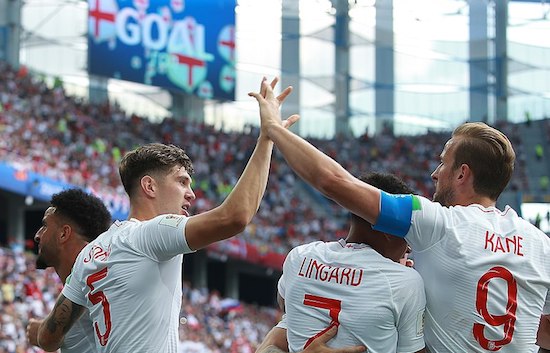You hear it everywhere. On Tuesday night, after England put a Colombia side distinguished only by its snideness out of the World Cup on penalties, the punters were singing it outside the pub across the road. "It’s coming home, it’s coming home, it’s coming/Football’s coming home…"
For the first time in a long time, perhaps for the first time ever, I didn’t feel the remotest impulse to sigh, or wince, or sneer. More than that; I was half minded to throw open the window and join in. I’m not claiming I represent some form of litmus test, but it’s evident I’m far from alone in this change of sentiment.
It’s not about the song, of course. It’s about Gareth Southgate and his England team winning a lot of us over. It’s one thing when people support you because they feel they must; another when they support you because they feel they want to.
Still, songs make for powerful symbols; what is an anthem if not exactly that, a symbol made sound? For one reason or another, there can be few anthems as liable to trigger anguish in so many listeners as that one. If you’re simply an England fan, the "thirty years of hurt" that "never stopped [you] dreaming" were followed by another twenty of frustration, disappointment and humiliation that surely would have done the trick. For many others, it’ll be something that runs deeper still, something much more likely to be associated with what goes on outside pubs, and on trains, and in the streets, than on any football pitch: it’s the sound of In-ger-lund, that three-syllable nation of jingos, and bigots, and braying bullies. People of whom they have had good cause to be afraid.
When I’ve had the misfortune to interact with such types, nine times out of ten I’ll clock them as middle-class LadsLadsLads using England games as a pretext for performative mob-handed approximations of what they evidently consider "authentic" working-class behaviour – that is, being loud, lairy herberts. Separate them from their fellows and the bravado evaporates. Most of the serious and/or working-class football fans I’ve known despise their type.
There’s nothing that says it has to be this way. In plenty of other footballing nations – most of them, perhaps – the fans can lose their shit in public without it having that air of menace, that cordite whiff of incipient violence, that has so long bedevilled England. It’s not hooliganism; not in the sense that any committed hooligan would understand it, at any rate. It’s more an amateur hour for faux hooligan wannabes. Fooliganism, if you will. Whatever the root causes of this, the upshot is that until now, publicly demonstrative England fandom has become largely the preserve of these gits.
Yet during this World Cup it feels as if that’s changed. This is in part simply to do with results that have exceeded much lowered expectations, given new endings to the same old story – the late winning goal against Tunisia, the penalties victory over Colombia. But there’s more to it than that. On a national stage dominated by incompetents, cranks, cowards, zealots and buffoons seemingly hell-bent on dragging us into the national disaster of a hard Brexit, Southgate is both a pleasant surprise, and a welcome respite: a calm, pragmatic, dignified manager guiding a fresh and appealing England football team. He is perhaps the only public figure in charge of anything in England right now to demonstrate genuine leadership: a capacity to plan well ahead; a sense of both practical and ethical purpose; a willingness to take responsibility, weather criticism, and be judged on results. He’s the grown-up in the room, prepared to do the hard graft of working out what it takes to prosper, rather than expecting it to come about through magical thinking.
Much has been made of Southgate laying the ghost of his penalty miss at Euro ’96 through England’s victory against Colombia. It’s an enticing narrative, but it misses something far more important, which is his exorcism of the England team’s more recent past. He has assembled a team both likeable and admirable, qualities even the most ardent fan would have struggled to attribute to its predecessors. It is sheer fluke that Southgate is in charge of England at all. The more impressed I’ve been with him, the more I’ve blessed the good fortune by which the repellent Sam Allardyce – with typical rapacity and hubris – managed to get himself binned off from the England job one game in. Allardyce, in the unimprovable phrasing of a friend of mine, represented "the last leak of flatus from the distended rectum of England’s Brave John Terry era." The England teams that contested the last few tournaments were built around a coterie of look-at-me whoppers: great players, some of them, but that only emphasises their underachievement in the national side. Whether it was Wayne Rooney with his "the big man’s back in town" act; or Steven Gerrard as Captain Hollywood; or Joe Hart, a case study in unwarranted arrogance superseding necessary confidence; or Terry himself, an odious slug of a man; or, most often, the whole bloody shower of them, there’s no question in my mind that Allardyce was the blowhard apotheosis of their collective spirit – the only thing about a clutch of self-entitled egomaniacs that was truly collective. That spirit was an ugly one, and I don’t doubt Allardyce would have produced ugly football to match it. The thing I like most about Southgate and his team is not that they’re playing reasonably well so far at this World Cup, making the best of their limited resources, showing character, togetherness and resilience, and succeeding in ways their predecessors notably failed – although all these things are true. The thing I like most about Southgate and his team is that I like them.
The day after the Colombia match, the comedian Nish Kumar posted a story on Twitter that, by his own admission, reads like one those God-awful right-on waspeye fantasies that end "…and the whole bus started cheering!" He wrote: "Watched the England game and then hopped on a train home. A bunch of England fans got on and were singing loudly. Already on the train were a Muslim family. There were two older girls in hijabs and two younger girls, one of whom was wearing an England football shirt. When she saw the England fans get on in their England shirts, the girl looked absolutely delighted. I was utterly terrified. One of them went over and double high fived the girl and then everyone started singing ‘Three Lions’. It was a properly great moment and [I] wanted to photograph it, print out the photos and then shove it in the mouths of people who think multiculturalism is a problem or impossible."
As Kumar rightly adds, "Obviously immigrants & their children shouldn’t have to prove themselves in any way and no one [is] obliged to support anyone and nationalism is pointless and idiotic. But what got me was the girl. She saw herself as an England fan & the England fans saw her as one of them."
And that’s the whole point here. Gareth Southgate, for all his qualities, is not an enchanted football pixie who is going to heal and unite our nation. What he has done is create a team for people who, whatever their background, like supporting the England team, and feel common cause with others of whom the same is true. It’s an England team that can help us with that thorny distinction between the curse of nationalism – with its vainglorious exceptionalism, its xenophobic retreat from the wider world and from the present, its invariable blood-and-soil racial overtones – and the simple ability to love and take pride in one’s country because it is one’s country. It’s too soon to claim that this England side will do for us what France’s did for its people in 1998 – provide a positive focal point and act as a rebuttal to the emboldened ranks of bigots – but it does have that potential. It looks and sounds and behaves like so much of what the bigots hate (witness the indecent targeting of Raheem Stirling), yet it is justly endearing itself to the nation as a whole. And unlike France, it wouldn’t need to win the thing to do it. Just to carry on as it has, win or lose.
When people sing about football coming home, it doesn’t mean, with a few giddy exceptions, they believe England will win the World Cup. We don’t need telling how improbable that is, although that won’t stop all the sages who think we do. England may go out to Sweden in the quarters and it won’t alter the significance of what’s already happened. What it means is that they feel they can be at home with football. It means that football belongs to them. Not just to bull-necked EDL sympathisers, or to obnoxious spanners pretending to be down with the plebs. But to all of us; to anyone who wants to claim it, not only watching at home or in the pub, but out in the street, on the train, in public. That inclusivity is a happy thing, just as England’s triumphs thus far have been happy things – and delighting in moments of joy is what life is all about. It’s not the England football team’s job to save the nation, and good thing too. What it can do is make us feel better about ourselves and about each other for a while, and it’s doing very nicely at that. Football’s coming home, regardless of what happens next, because home is where the heart is.



